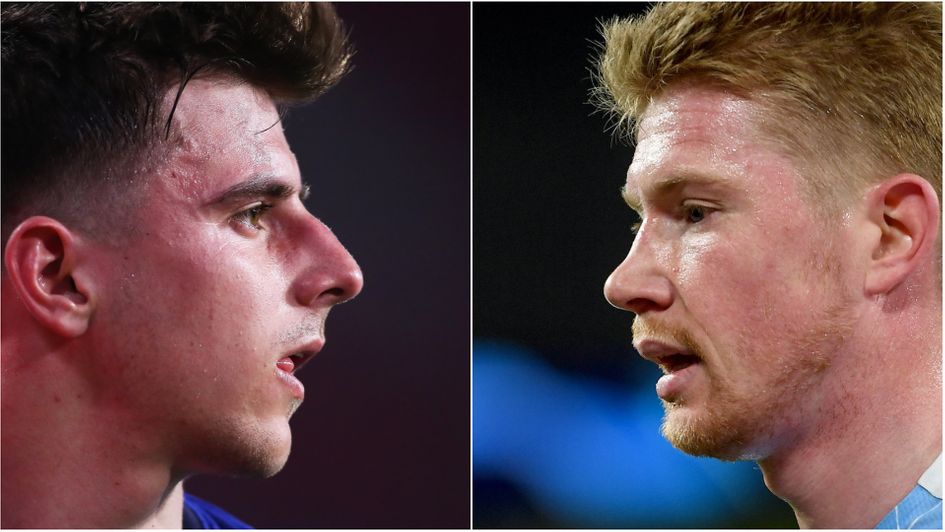The most prolific, productive midfielder in Chelsea’s history was finished off in part by the man who could have been his successor.
Frank Lampard’s penultimate defeat as manager came in a January evisceration by Manchester City; inspired by Kevin De Bruyne, the false nine who eluded Chelsea at will. He scored one goal and created another. Chelsea were outclassed. City won 3-1.
De Bruyne’s new contract means he will spend 10 years at Etihad Stadium, giving Chelsea a decade to repent and regret Jose Mourinho’s reluctance to pick and willingness to sell him.
KDB better than ever?
Even in a season when De Bruyne has been outscored by Ilkay Gundogan, he remains an outlier in other respects; as a creator, he is in a league of his own. Statistically, last season was the Belgian’s outstanding year: he scored 13 league goals and assisted 20, equalling Thierry Henry’s Premier League record.
Yet his combined total of expected goals (xG) and expected assists (xA) per 90 minutes (0.88) is actually higher than last season.
What is expected goals (xG)?
- Expected goals (xG) is a metric that measures the quality of any given scoring opportunity
- Expected goals for (xGF) is the xG created by a team
- Expected goals against (xGA) is xG conceded by a team
De Bruyne tops what might be called the De Bruyne table: for shot-creating actions per 90 minutes, with 6.18. He was a runaway winner last season, with 7.16, second to Eden Hazard in 2018-19, a season he missed much of due to injury, and fourth in 2017-18.
But for injury that has limited him to 24 league games, he would probably lead the assists chart, instead of Harry Kane, and have the most shot-creating actions; instead of Bruno Fernandes.
The Manchester United man also has the most completed passes into the penalty area, followed by Trent Alexander-Arnold and then De Bruyne.
How good is Mason Mount?
And yet there may be a surprise new entry in the creativity charts.
De Bruyne, Fernandes, Alexander-Arnold and Jack Grealish all figured prominently in various categories last season. But now the player with the second highest number of key passes, and five more than De Bruyne, is Mason Mount.
He has the third most shot-creating actions, two more than De Bruyne (but from more minutes, and with an average of 5.06 per 90 minutes). Some 42 shots have stemmed from his set-pieces, 10 more than anyone else’s.
Perhaps Mount’s creativity has been camouflaged by his team-mates’ misses: he has an xA of 7.67, the sixth highest in the Premier League, but only four actual assists.
It may not yet make him the Chelsea De Bruyne, but Mount’s capacity to improve year on year is reflected in the numbers. He already has made more shot-creating actions than in the whole of last season and more in both open play and from dead-ball situations.
Last season, he averaged 3.67 per 90 minutes, putting him 21st in the league. It is roughly where Phil Foden is now (3.57 per 90 minutes, down from 4.50 last season) and part of the difference between two young England internationals lies in the context.
Foden is one of a band of creators bunched together in De Bruyne’s supporting cast at City: he, Riyad Mahrez, Gundogan, Bernardo Silva and Raheem Sterling all average between 3.39 and 3.80 shot creating actions per 90 minutes.
Mount indispensable to Chelsea
Statistically, some of them are interchangeable for Guardiola, whereas Chelsea are reliant on Mount.
He has had 65 shots; the profligate Timo Werner has had 63, but no other Chelsea player has more than 31. His xG is third only to Werner and the penalty taker Jorginho; he is one of only four Chelsea midfielders or forwards to outperform their xG.
Mount has made the most passes into the penalty area of any Chelsea player. His 133 shot-creating actions is almost double Werner’s 70; his 5.06 per 90 minutes far above Christian Pulisic (3.70), Werner (2.95), Kai Havertz (2.82).
If in part it reflects the stop-start nature of some of the seasons of Chelsea’s creative players, many of whom have been in an out of the team, it is nonetheless apparent that Mount is dramatically outperforming the expensive imports.
If Havertz was envisaged as Chelsea’s answer to De Bruyne, the Bundesliga prodigy brought in at a young age, so far Mount has assumed more of that mantle.
De Bruyne the assists king
And yet what separates De Bruyne from the rest, more than anything else is the sheer volume of his assists.
He has by far the most since his Premier League debut (77 in under six seasons) and looks destined to end up second only to Ryan Giggs (162) in the division’s all-time chart. He is already 10th and each of the first nine was a Premier League regular for at least eight seasons.
Part of the extraordinary element about De Bruyne is his consistency. He has got at least nine league assists in nine seasons, the first when he was just 19. In contrast, Mount’s personal best to date is eight with Vitesse Arnhem.
Havertz and Werner’s career bests are eight, Pulisic’s seven; only Hakim Ziyech, who was in double figures six times in the Eredivisie, has a track record of producing De Bruyne-style numbers, albeit in a lesser league.
Chelsea’s spending in the last couple of years, bringing in Pulisic, Ziyech, Werner and Havertz for a combined £220 million, can be seen as a belated attempt to compensate for letting De Bruyne, Mohamed Salah and Romelu Lukaku escape their grasp. They get regular reminders of the ones who got away.
But when they face De Bruyne at Wembley on Saturday, it may be with the homegrown Mount charged with emulating him.
